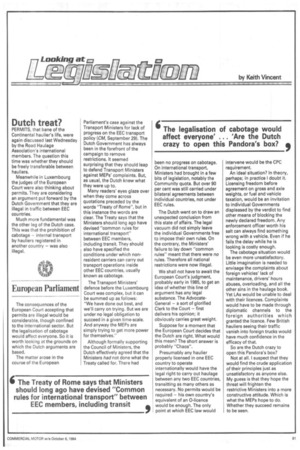Dutch treat?
Page 85

If you've noticed an error in this article please click here to report it so we can fix it.
PERMITS, that bane of the Continental haulier's life, were again discussed last Wednesday by the Road Haulage Association's international members. The question this time was whether they should be freely transferable between hauliers.
Meanwhile in Luxembourg the judges of the European Court were also thinking about permits. They are considering an argument put forward by the Dutch Government that they are illegal in traffic between EEC countries.
Much more fundamental was the other leg of the Dutch case. This was that the prohibition of cabotage — internal transport by hauliers registered in another country — was also illegal.
European Parliament
The consequences of the European Court accepting that permits are illegal would be considerable, though confined to the international sector. But the legalisation of cabotage would affect everyone. So it is worth looking at the grounds on which the Dutch arguments are based.
The matter arose in the course of the European Parliament's case against the Transport Ministers for lack of progress on the EEC transport policy (CM, September 29). The Dutch Government has always been in the forefront of the campaign to remove restrictions. It seemed surprising that they should leap to defend Transport Ministers against MEPs' complaints. But, as usual, the Dutch knew what they were up to.
Many readers' eyes glaze over when they come across quotations preceded by the words "Treaty of Rome", but in this instance the words are clear. The Treaty says that the Ministers should long ago have devised "common rules for international transport" between EEC members, including transit. They should also have specified the conditions under which nonresident carriers can carry out transport operations inside other EEC countries, usually known as cabotage.
The Transport Ministers' defence before the Luxembourg Court was complex, but it can be summed up as follows: "We have done out best, and we'll carry on trying. But we are under no legal obligation to succeed in a given time-scale. And anyway the MEPs are simply trying to get more power for themselves."
Although formally supporting the Council of Ministers, the Dutch effectively agreed that the Ministers had not done what the Treaty called for. There had been no progress on cabotage. On international transport, Ministers had brought in a few bits of legislation, notably the Community quota. But over 90 per cent was still carried under bilateral agreements between individual countries, not under EEC rules.
The Dutch went on to draw an unexpected conclusion from this state of affairs. The legal vacuum did not simply leave the individual Governments free to impose their own rules. On the contrary, the Ministers' failure to lay down "common rules" meant that there were no rules. Therefore all national restrictions were now illegal.
We shall not have to await the European Court's judgment, probably early in 1985, to get an idea of whether this line of argument has any legal substance, The AdvocateGeneral — a sort of glorified Clerk to the Court — first delivers his opinion; it obviously carries great weight.
Suppose for a moment that the European Court decides that the Dutch are right. What would this mean? The short answer is probably "Chaos".
Presumably any haulier properly licensed in one EEC country to operate internationally would have the legal right to carry out haulage between any two EEC countries, transitting as many others as necessary. No permits would be required — his own country's equivalent of an 0-licence would be enough. The only point at which EEC law would intervene would be the CPC requirement.
An ideal situation? In theory, perhaps; in practice I doubt it. Licensing freedom before agreement on gross and axle weights, or fuel and vehicle taxation, would be an invitation to individual Governments displeased by the verdict to find other means of blocking the newly declared freedom. Any enforcement officer worth his salt can always find something wrong with a vehicle. Even if he fails the delay while he is looking is costly enough.
The cabotage situation would be even more unsatisfactory. Little imagination is needed to envisage the complaints about foreign vehicles' lack of maintenance, drivers' hours abuses, overloading, and all the other sins in the haulage book. Yet LAs would be unable to deal with their licences. Complaints would have to be made through diplomatic channels to the foreign authorities which granted the licence. Few British hauliers seeing their traffic vanish into foreign trucks would have much confidence in the efficacy of that.
So are the Dutch crazy to open this Pandora's box?
Not at all. I suspect that they would find the crude application of their principles just as unsatisfactory as anyone else. My guess is that they hope the threat will frighten the restrictive Ministers into a more constructive attitude. Which is what the MEPs hope to do. Whether they succeed remains to be seen.




























































































































































